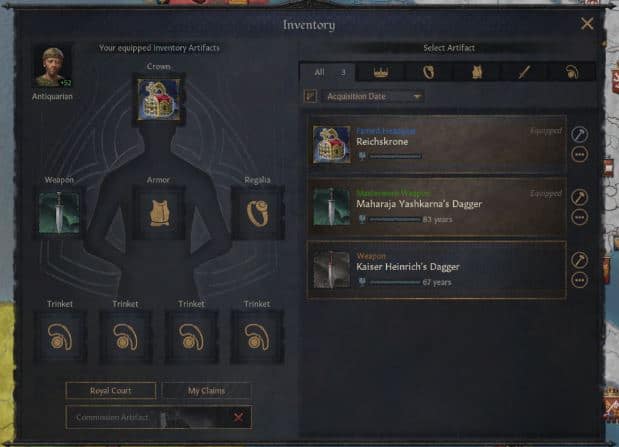Crusader Kings 3 is one of the finest strategic role-playing games released in recent memory, largely due to its tactical gameplay and deep systems. One of these systems is the court position system and there are a wide range of court positions available to players. Each one of them offer unique benefits and the Antiquarian court position can be one of the most important if utilized effectively. Since there are a wide range of artifacts in the, the Antiquarian is very useful since their primary role is to craft, protect, acquire and repair these powerful items. Learn more with our CK3 Antiquarian Guide.
What is a court position in CK3?

A court position in Crusader Kings 3 is a specialized role that can be granted to courtiers and direct vassals. These roles grant a variety of benefits to the player but you must pay them a monthly salary with gold. This salary can differ between the different court positions, but each of them have a set base salary. This salary cannot be revoked without paying 200 prestige, so keep in mind when selecting a court position. The effectiveness of these court positions is determined by a value called aptitude, which can be affected by family status. Court positions fall into a rarity category which consists of common, special and royal. Overall, there are 24 unique court positions in Crusader Kings 3, all offering something useful to the player.
What is the Antiquarian in CK3?
An Antiquarian is a person who specializes in the study and collection of rare artifacts. This applies within Crusader Kings 3 by offering them between -7% and -35% Artifact decay reduction, to help preserve your plunder. As well as preventing decay to Artifacts, the Antiquarian court position also offers between 0 and -80% chance of losing Artifacts in raids and sieges. On top of this, having an Antiquarian also enables the ‘commission artifact’ decision and allows the repair or reforge of held artifacts. These effects are liege benefits but there are also effects on the position holder themselves.
These position holder effects include +5 to the opinion of the liege and +0.5 monthly prestige. The drawback to having an Antiquarian is that you cannot have another position, which is something one must consider carefully. As for the requirements, in order to get an Antiquarian, the individual must not be a counselor, spouse or vassal candidate. The base salary of an Antiquarian is 0.15 gold.
See Also: The Best Duchies in CK3
What makes a good Antiquarian in CK3?
As described, the key role of the Antiquarian is to commission, protect and repair artifacts. There are certain things that can benefit an Antiquarian’s aptitude. Various traits in the game will raise this aptitude level, such as learning which will grant +2.5 aptitude up to a maximum value of 60. If the Antiquarian has the Administrator trait, you will receive +10 aptitude. Additionally, if an inspiration has been completed, you will receive +30 aptitude.
What is aptitude in CK3?
Aptitude is a value that goes through 5 levels in Crusader Kings 3, each offering increasing benefits. These levels are Terrible (0 points), Poor (20 points), Average (40 points), Good (60 points) and Excellent (80 points). It is worth noting that family members of the same culture will gain +20 aptitude if the culture has the ‘Family Business’ tradition.
Why does aptitude matter in CK3?
Aptitude is one of the most important factors to pay attention to in Crusader Kings 3. It improves the bonuses offered by each court position. We already mentioned the potential buffs to artifact decay reduction and the chance of losing artifacts. To make the most effective Antiquarian, you want to aim to reach maximum aptitude to reap the most benefits to artifact preservation. Other court positions offer different benefits based on aptitude. Each court position is suited to certain individuals based on their traits.
What are Artifacts in CK3?
We have mentioned the benefits that an Antiquarian can provide in terms of artifacts, but what exactly are they and why do they matter? Artifacts are culturally relevant items that can be crafted or collected around the world. Certain artifacts can actually be equipped on your person or displayed in the throne room to provide additional buffs.
Stealing artifacts often comes at a price, since their cultural significance may incite a duel or even a war. This can go both ways. However, as you can begin a conflict if you have good reason to upon the loss of an artifact during a raid or siege.
If you die, your owned artifacts will be passed down to your heir. If this heir is not a close family member the artifact can be damaged or completely destroyed in the process. These artifacts can generally be split into three categories. Inventory artifacts can be equipped by the ruler to provide bonuses. Court artifacts can also be displayed to provide bonuses and crafted artifacts will vary based on your culture. Antiquarians can repair or reforge artifacts, which can be incredibly beneficial to retain buffs, bonuses and aesthetics.
Conclusion
There are many court positions available within Crusader Kings 3, each offering unique bonuses at different aptitude levels. Artifacts can provide a wide range of buffs. The Antiquarian is an effective way to acquire, protect and repair them.
While there are some requirements for an Antiquarian, there are also a range of traits that make for the perfect fit. These traits are learning and administrator. Completing an inspiration is another good way to ensure the maximum aptitude can be achieved.
If you opt for an Antiquarian court position, this guide has highlighted some key things to consider to become the ultimate acquirer of artifacts.




Be the first to comment